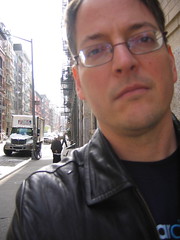Three Books
Too long for Twitter: Three books the people who actually build high tech products should read:
Crossing the Chasm by Geoffrey Moore. Just read the whole thing cover-to-cover. Sure, it talks about ways to move from early to mainstream markets, but it also explains just what a market is, the difference between a cool technology and a "Whole Product" that's useful enough for somebody to actually pay for, and how to care for, feed and eventualy abandon early adopters. Moore didn't invent all (or even most of) the ideas in the book, but he took a bunch of esoteric information and turned it into a coherent, easy-to-read strategy for taking technology products to market.
The Four Steps to the Epiphany by Steven Gary Blank. Unlike Crossing, this one's a bit of a slog, but if you're selling to businesses rather than consumers resist the temptation to skim it or read one of the "lite" versions floating around. Blank takes a bunch of industry best practices, mixes in his own hard-won wisdom, and produces a plan for turning an idea into a workable business. Spend a day or two reading through Crossing to get some background, then spend as long as it takes to get through Four Steps. It's worth it.
Solution Selling by Michael T. Bosworth. There's "New Solution Selling" by Eades and "Spin Selling" by Rackham, but the takeaway should be the same no matter which you choose: selling is not a black art that only born salesmen can understand. Selling is a rational processing of matching customer needs to your solutions, and you (yes you, geek engineer) are fully capable of doing it. The key is that we're not talking hucksters selling vacuum cleaners door-to-door, we're talking selling expensive, complex, high-tech solutions in an ongoing relationship. And that means actually solving your customer's problem is important. And that firmly aligns the selling with the engineering. A good engineer is still going to need to put in some work to become a competent high-tech salesperson, but engineers have a huge advantage over non-engineers in this arena.
Four Steps has a great appendix with many more recommendations, but those three are the must-reads I'd want anyone I was working with (CEO to engineering intern) to have read and understood.
You should follow me on twitter here.


